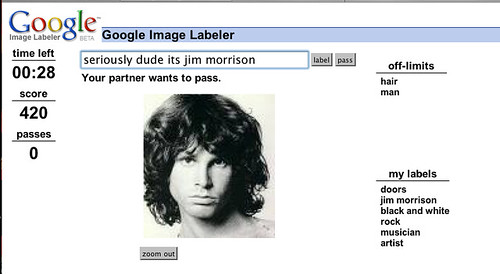Scaling Spam Eradication Using Purposeful Games: Die Spammer Die!
Update: As expected I'm undergoing a massive spam attack for speaking truth to dark powers. This is the time to be strong. Together we can make a change. What change you may ask? I can't say, just change and lots more change. Let's link arms together and bravely stand against the forces of chaos for a better yesterday and a better tomorrow.
CAPTCHA doesn't work. Even Google can't make CAPTCHA work (Spammers Choose GMail). And even if CAPTCHA worked it wouldn't really work because CAPTCHA solving markets (Inside India’s CAPTCHA solving economy) have evolved where for a mere $2 you can buy 1000 human broken CAPTCHA's. And we know once the free market tackles a problem that's it. Game over :-)
Making ever more clever CAPTCHA programs won't outwit and outlast the CAPTCHA solving markets. Until Skynet evolves the only way to defeat humans is with humans.
Using Games to Get Humans to Do Work (like CAPTCHA) for Free
How do we harness the power of humans to do battle with the CAPTCHA solving networks, without, of course, paying them anything? We make it a game! In particular we make a Game With a Purpose (GWAP). Read all about GWAPs in Designing games with a purpose. A GWAP is a game in which people, as a side effect of playing, perform tasks computers are unable to perform.
Google's Image Labeler
A good example GWAP is Google's Image Labeler, a game in which people provide meaningful, accurate labels for images on the Web as a side effect of playing the game; for example, an image of a man and a dog is labeled "dog," "man," and "pet.". Now this sounds like work. And it is. But because it's made into a game people will do it for free!
An example Labeler session looks like:
In the game two people are matched at random to label the same set of images. Points are awarded when you and your partner match labels. Top scores are kept so you can earn your label street cred. But can't people cheat? GWAP games include cheating detection mechanisms, but we won't go into detail here, see Designing games with a purpose for cheater foiling strategies.
ESP Game, Tag a Tune, and Squigl
More games can be found at the GWAP Home Page. They have the ESP Game which is like Labeler. Tag a Tune is a game where players hear tunes, describe them, and through the description guess if they are listening to the same tune.
In Squigl partners see an image and a word. Using the mouse each player traces the object described by the word in the image. Winning is when both players trace the same image. Here's what a Squigl session looks like:
So you see the pattern. Players are picked from a pool. They are asked to do some task that's hard for computers to do. The task must be structured so that winning enables the system to learn something valid while providing a feeling of game play for the humans. Points are awarded and scores are kept to keep the poor human slaves playing.
Creating a Spam Catcher Game
With the basic ideas in place let's create a game for identifying and filtering out comment spam. According to Designing games with a purpose this appears to a be an output-agreement type game, which has the following structure:
Simple enough. But comments exist as a part of blogs, websites, microblogging engines, and other programs. Any game has to interface with live systems.
Integrating the game with a comment system might work something like:
It's not too hard too imagine such a system being used for content other than comments and for making judgments like age appropriateness and other subtle criteria that could be communicated using site meta data.
One UI idea it to make the game like a first-person-shooter. Spam is blasted into a 1000 pieces. Oh that would be rewarding, but you can also imagine all the usual game type mechanisms to keep people interested. An accuracy feedback loop would be useful to rate players so less accurate players could be dropped from the game.
Players would be recruited from the general population. Another good source of players is the site owners and the site participants who's sites are the source of comments. This would be sort of Internet Comment Tax for keeping the Internet safe and sane.
I, for example, would sign up to process 500 comments a week in order to have HighScalability.com comments processed by the game. Everyone else taking advantage of the system could pledge a number that made sense for their site. This would provide a ready pool of motivated players and docents to keep the game running efficiently.
A nice widget system would make it possible to play the game from any site.
The Final Move
Spam crushes many sites. Many site owners don't even allow comments anymore because of the time it takes to deal with spam, which is a shame, because without interactivity the internet might as well be a newspaper. We can't let those spammers win! A system like the Spam Catcher Game might be able provide the human oversight, quick latency, and high throughput needed to out compete the CAPTCHA solving networks. The game is finally afoot!


